-
ORIGINAL ARTICLE12-04-2023
“Fala-M@no-COVID-19”: technological development of a health navigation program for men during the pandemic
Revista Brasileira de Enfermagem. 2023;76(6):e20220534
Abstract
ORIGINAL ARTICLE“Fala-M@no-COVID-19”: technological development of a health navigation program for men during the pandemic
Revista Brasileira de Enfermagem. 2023;76(6):e20220534
DOI 10.1590/0034-7167-2022-0534
Views0See moreABSTRACT
Objective:
to develop a care-educational technology similar to a health navigation program for men during the COVID-19 pandemic.
Methods:
a methodological and qualitative study of a care-educational technology of health navigation program, structured by Program Development Cycle, with 16 patient navigators and 10 professional navigators. It used reflective thematic content analysis and an adaptation model for data processing.
Results:
the ; navigation program was developed by: I) Observation of reality, problem mapping, needs assessment: content selection, creation of domains and questions; II) Theoretical-conceptual and methodological definition, creation of product under the elaboration of care plans, based on theory, process and taxonomies by a flowchart of operationalization of actions; and III) Self-assessment: qualitative research with professional navigators.
Final considerations:
the technology developed, with theoretical and methodological support, allowed to derive a viable navigation program compatible with reality based on the audience’s needs.
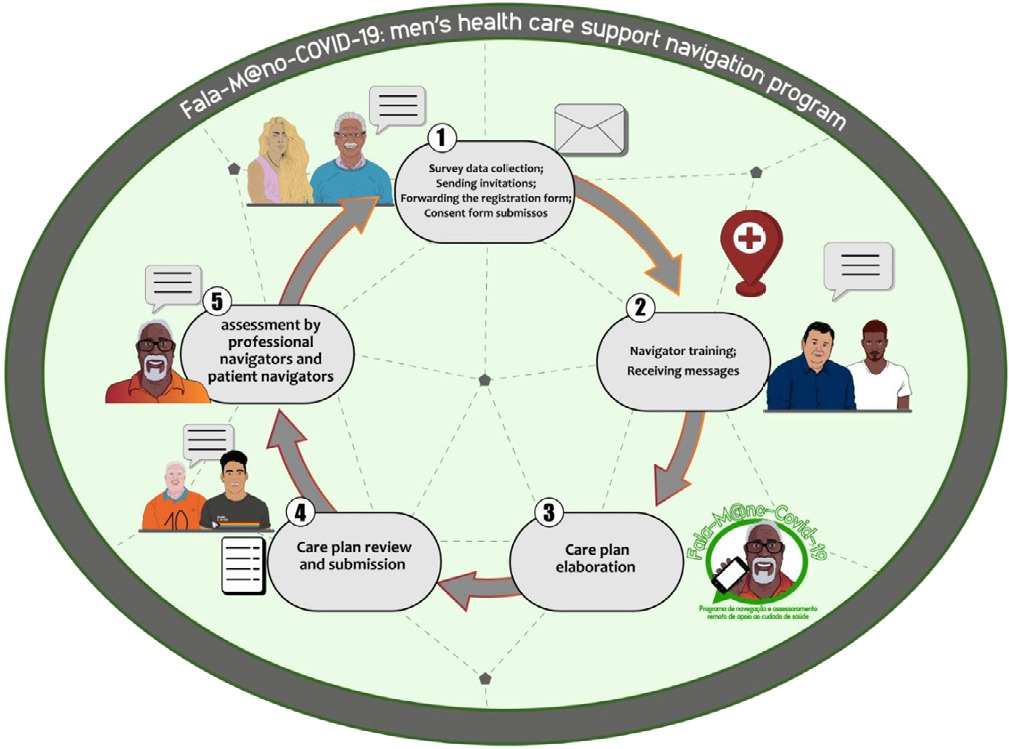
-
ORIGINAL ARTICLE12-04-2023
Social representation of young people in higher education about sexually transmitted infections
Revista Brasileira de Enfermagem. 2023;76(6):e20220406
Abstract
ORIGINAL ARTICLESocial representation of young people in higher education about sexually transmitted infections
Revista Brasileira de Enfermagem. 2023;76(6):e20220406
DOI 10.1590/0034-7167-2022-0406
Views0See moreABSTRACT
Objective:
to analyze the social representations about sexually transmitted infections elaborated by undergraduate students.
Methods:
a descriptive, qualitative study, in the light of the structural approach of Social Representation Theory, carried out with 160 young undergraduate students, in the second half of 2019, in the city of Rio de Janeiro. Data were collected using a sociodemographic characterization questionnaire, knowledge and practices for preventing sexually transmitted infections, analyzed using descriptive statistics and a form of free evocations with the inducing term STD, analyzed using prototypical and similarity analysis.
Results:
the representation’s possible central nucleus is composed of lexicons aids, disease and HIV; the peripheral system by syphilis, sex, condoms, gonorrhea, prevention, infection, carelessness, HPV, herpes, ignorance, treatment, fear, unprotected-sex and danger.
Final considerations:
social thinking about sexually transmitted infections is characterized by their recognition as diseases, which require barrier prevention measures, associating with unsafe sexual practices that arouse fear.

-
12-04-2023
The Medical Healing of Souls: a strategy for welcoming post-pandemic mental health
Revista Brasileira de Enfermagem. 2023;76(6):e20220331
Abstract
The Medical Healing of Souls: a strategy for welcoming post-pandemic mental health
Revista Brasileira de Enfermagem. 2023;76(6):e20220331
DOI 10.1590/0034-7167-2022-0331
Views0See moreABSTRACT
Objective:
to reflect on the applicability of the Medical Healing of Souls (MHS) by health professionals as a welcoming strategy in post-pandemic mental health.
Methods:
a theoretical and reflective study, based on Viktor Frankl’s philosophy, based on the book “The Doctor and the Soul, From Psychotherapy to Logotherapy” and scientific literature.
Results:
the study was structured in two discursive approaches: MHS in the field of health; The applicability of MHS in post-pandemic mental health care.
Final considerations:
MHS can be used in mental health care, in health emergencies, promoting a more humane performance of health professionals, facilitating the integration of inevitable suffering into a meaningful life.
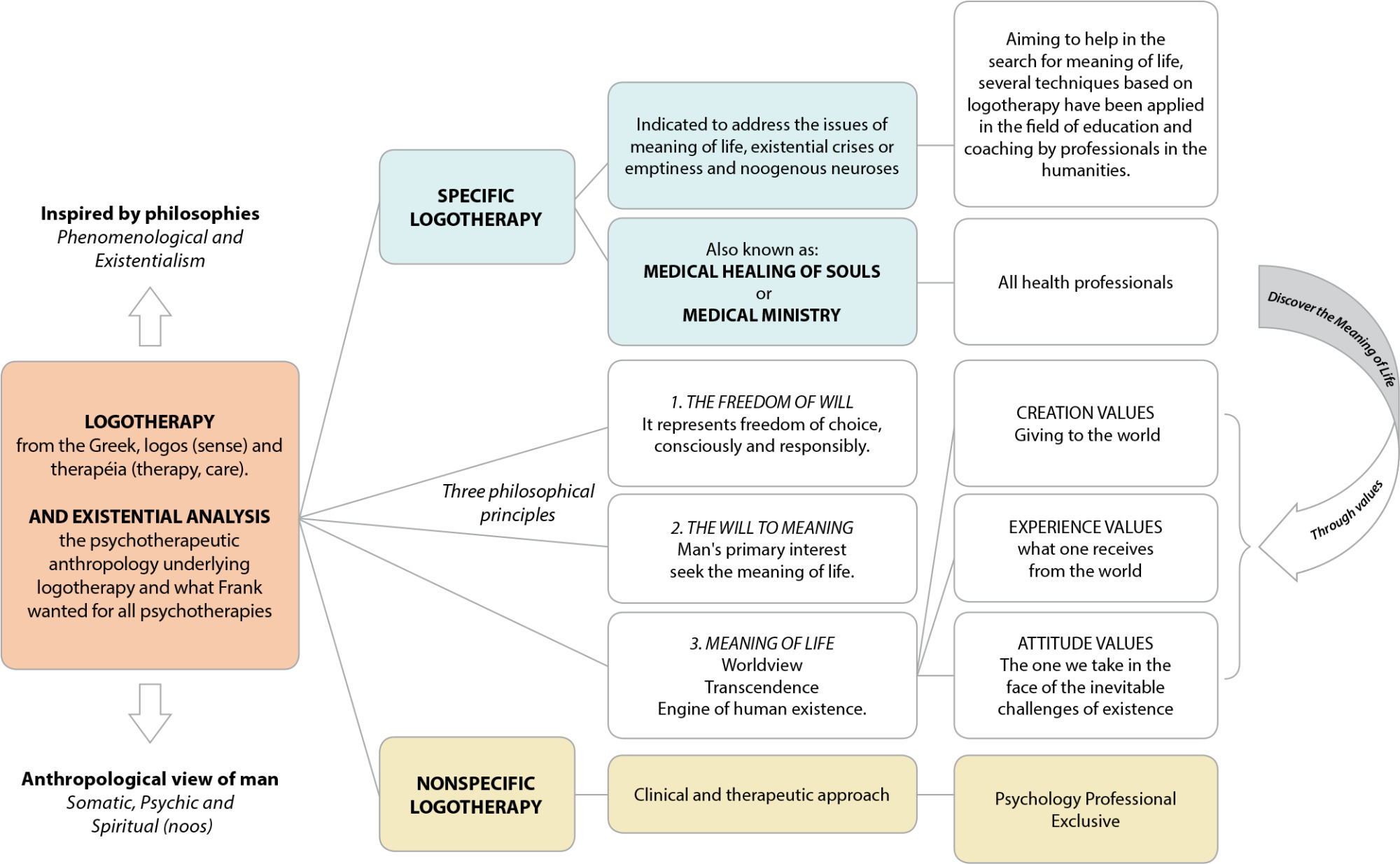
-
ORIGINAL ARTICLE12-04-2023
Translation, cross-cultural adaptation and validity study of the “Play Nicely Program: The Healthy Discipline Handbook” for use in Brazil
Revista Brasileira de Enfermagem. 2023;76(6):e20220281
Abstract
ORIGINAL ARTICLETranslation, cross-cultural adaptation and validity study of the “Play Nicely Program: The Healthy Discipline Handbook” for use in Brazil
Revista Brasileira de Enfermagem. 2023;76(6):e20220281
DOI 10.1590/0034-7167-2022-0281
Views0See moreABSTRACT
Objective:
to describe the translation, cross-cultural adaptation and validity process of the “Play Nicely Program: The Healthy Discipline Handbook” for use in Brazil.
Methods:
a methodological study that followed the translation, back-translation, expert committee assessment, and pre-test steps. The Content Validity Index (CVI) was calculated for both the judge population and the pre-test population. Four translators, seven expert judges in the field of child health and thirty participants in the pre-test, including parents, teachers and healthcare professionals, participated in the study.
Results:
in experts’ analysis (98.4%), a value of 100% of adequate assessments was obtained, and in the target population’s analysis (89.5%), there were 100% of adequate assessments. In both analyses, suggested adaptations were made.
Conclusios:
cross-cultural adaptation and content validity into Brazilian Portuguese of the “Play Nicely Program: The Healthy Discipline Handbook” were considered adequate for application in the target population.

-
ORIGINAL ARTICLE12-04-2023
Assessment of the components of sarcopenia and quality of life perceived of individuals on hemodialysis
Revista Brasileira de Enfermagem. 2023;76(6):e20220677
Abstract
ORIGINAL ARTICLEAssessment of the components of sarcopenia and quality of life perceived of individuals on hemodialysis
Revista Brasileira de Enfermagem. 2023;76(6):e20220677
DOI 10.1590/0034-7167-2022-0677
Views1See moreABSTRACT
Objectives:
to evaluate the prevalence of sarcopenia in individuals aged 50 years or older on hemodialysis; to verify the association between sarcopenia and sociodemographic, clinical, anthropometric factors, components of sarcopenia and quality of life (QoL); and to correlate the components of sarcopenia with QoL.
Methods:
Participated 83 individuals on hemodialysis. Sarcopenia was established according to the current European consensus. Dynamometry to determine strength, calf circumference (CC) and appendicular skeletal muscle mass index (ASMMI) to obtain muscle mass and gait speed (GS) for physical performance. For QoL used the WHOQOL-bref.
Results:
the prevalence of sarcopenia was 32.6% (CC) and 18.1% (ASMMI). There was no association between sarcopenia and QoL. Both handgrip strength (r=0.25) and GS (r=0.36) showed a correlation with physical domain.
Conclusions:
sarcopenia was expressive, and the aspects of functionality determine the physical impairment in this population.
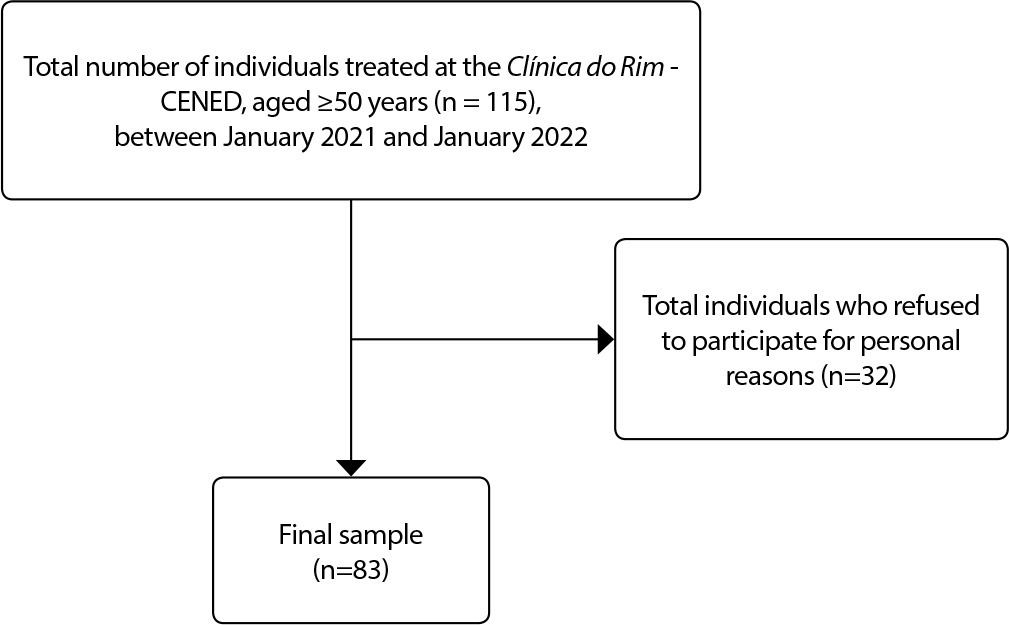
-
ORIGINAL ARTICLE12-04-2023
Effects of auriculotherapy on anxiety and biomarkers in Primary Health Care: a clinical trial
Revista Brasileira de Enfermagem. 2023;76(6):e20220728
Abstract
ORIGINAL ARTICLEEffects of auriculotherapy on anxiety and biomarkers in Primary Health Care: a clinical trial
Revista Brasileira de Enfermagem. 2023;76(6):e20220728
DOI 10.1590/0034-7167-2022-0728pt
Views0See moreABSTRACT
Objective:
to assess the effects of auriculotherapy on anxiety and brain-derived neurotrophic factor (BDNF), neuron-specific enolase (NSE) and S100 calcium-binding protein B (S100B) serum levels in adults assisted in Primary Health Care.
Methods:
a pre-experimental pilot clinical trial. Information was obtained from 19 patients using the State-Trait Anxiety Inventory (STAI) and analysis of BDNF, NSE and S100B serum levels.
Results:
the pre-intervention anxiety score in the IDATE-Trait was 52.11±6.691 (CV 12.84%) and the assessment after auriculotherapy was significantly lower (43.72±8.141; CV 18.62%; P=0.0007). S100B levels were significantly reduced after auriculotherapy (from 64.03±72.18 to 54.03±68.53 pg/mL; CV 126.8%; P=0.0023).
Conclusion:
auriculotherapy effectively reduced anxiety levels. It proved to be safe and easy to apply, allowing nurses to perform this technique autonomously. A reduction of S100B was also evidenced, demonstrating possible prevention of neuronal damage.
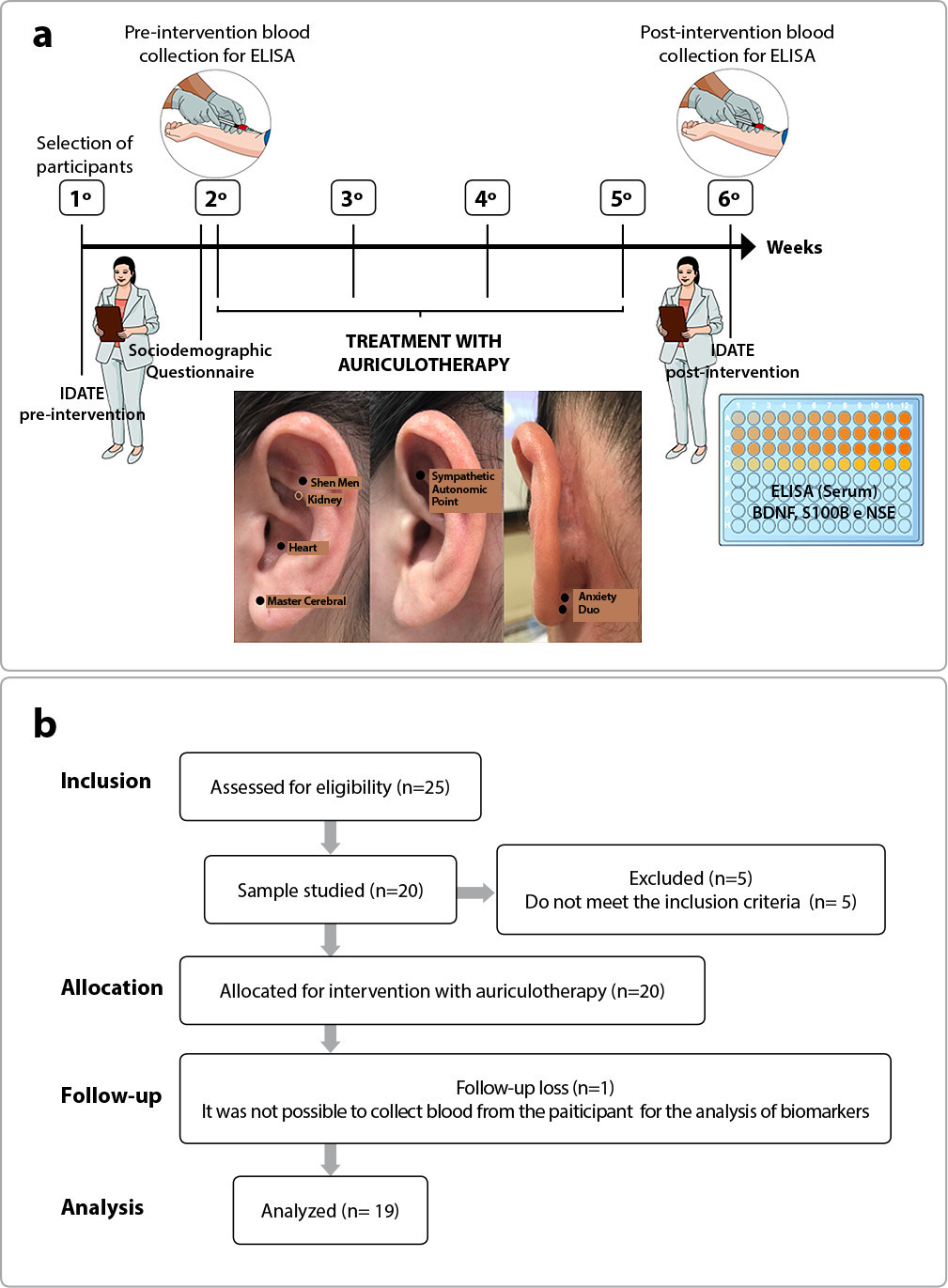
-
ORIGINAL ARTICLE12-04-2023
Leadership Competencies of the Medical-Surgical Nursing Specialist Nurse
Revista Brasileira de Enfermagem. 2023;76(6):e20220721
Abstract
ORIGINAL ARTICLELeadership Competencies of the Medical-Surgical Nursing Specialist Nurse
Revista Brasileira de Enfermagem. 2023;76(6):e20220721
DOI 10.1590/0034-7167-2022-0721
Views0See moreABSTRACT
Objective:
To identify the leadership competencies of Medical-Surgical Nursing Specialist Nurses.
Methods:
A quantitative, descriptive study using the Leadership Competencies Questionnaire. 311 Portuguese Medical-Surgical Nursing Specialist Nurses participated. Data analysis involved descriptive and inferential statistical analysis using the Statistical Package for Social Sciences (SPSS), version 22.0.
Results:
Study participants had an above-average self-perception on the scale (mean = 3.5) in all leadership roles, recognizing their leadership competencies. The leadership competencies of Medical-Surgical Nursing Specialist Nurses are balanced across all roles: Mentor (5.80 ± 1.02); Coordinator (5.53 ± 0.86); Facilitator (5.38 ± 1.04); Innovator (5.34 ± 0.88); Director (5.31 ± 1.10); Producer (5.30 ± 0.98); Monitor (5.15 ± 1.00); Corrector (4.79 ± 1.29)
Conclusions:
Specialized nursing practice enhances nurses’ self-perceived leadership competencies. Nurses see themselves as leaders focused on internal support and facilitation of collective effort and opportunities for skill development.
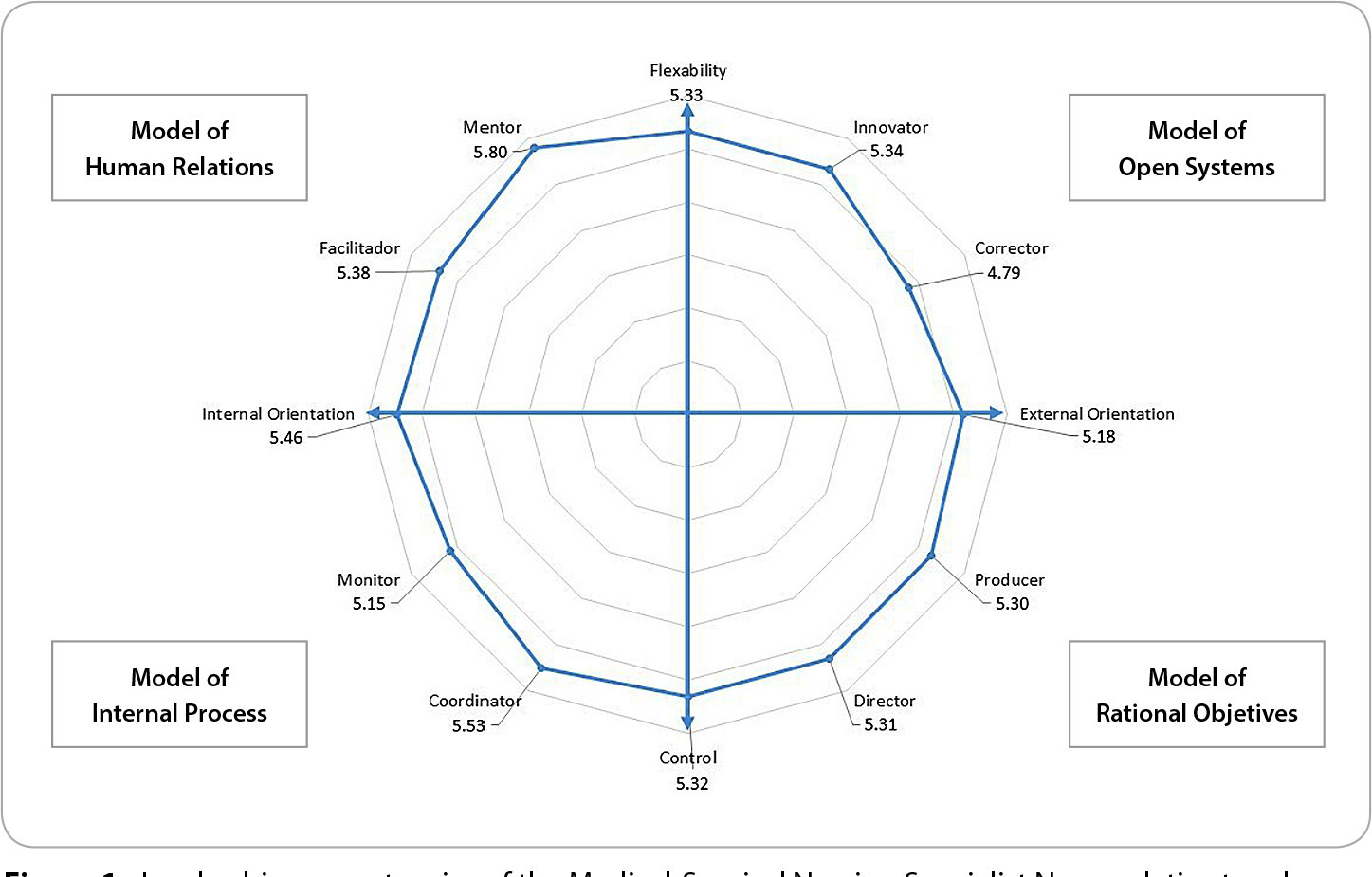
-
ORIGINAL ARTICLE12-04-2023
Feelings about birth by a group of high-risk pregnant women
Revista Brasileira de Enfermagem. 2023;76(6):e20230059
Abstract
ORIGINAL ARTICLEFeelings about birth by a group of high-risk pregnant women
Revista Brasileira de Enfermagem. 2023;76(6):e20230059
DOI 10.1590/0034-7167-2023-0059
Views0See moreABSTRACT
Objective:
to understand feelings about birth among a group of high-risk pregnant women.
Method:
a descriptive and qualitative study, using Alfred Schütz’s social phenomenology as a philosophical theoretical framework. The study included 25 pregnant women undergoing high-risk prenatal care. The interview had the following guiding questions: tell me about your feelings regarding the moment of birth/childbirth; How do you deal with the high-risk diagnosis? What are your expectations for birth/childbirth?
Results:
five categories emerged: Fear of obstetric care; Fear of complications with the baby; Fear of cesarean section; Resilience in the face of high-risk pregnancy; and Expectations for birth.
Considerations:
high-risk pregnant women are afraid of the care they will receive, the risks and concern about the baby’s vitality at birth. The importance of care is emphasized, with a welcoming environment, bonding and communication between health team and pregnant woman.
-
EXPERIENCE REPORT01-01-2018
Clinical and epidemiological teaching of dengue through simulated practice
Revista Brasileira de Enfermagem. 2018;71(2):451-456
Abstract
EXPERIENCE REPORTClinical and epidemiological teaching of dengue through simulated practice
Revista Brasileira de Enfermagem. 2018;71(2):451-456
DOI 10.1590/0034-7167-2016-0503
Views2See moreABSTRACT
Objective:
to describe the experience of clinical teaching on dengue and the practice of epidemiological surveillance using problematization methodology.
Method:
report of experience on educational activity with undergraduate nursing students, held in March 2016, at a public university in the city of São Paulo, conceived in four stages: dialogic lecture, active search of Aedes aegypti, case study and simulation of nursing consultation to individuals with dengue.
Results:
The activity allowed to retrieve previous knowledge about the disease, respond to exercises that addressed different clinical situations and epidemiological surveillance, including in situ evaluation of possible mosquito outbreaks, and discuss the need to expand prevention and health of the individual and the community, the impact of the media in the dissemination of cases and the coping difficulties experienced in the different levels of attention.
Conclusion:
the methodology adopted enabled qualified training of students to cope with dengue.

-
ORIGINAL ARTICLE07-18-2022
Beliefs, knowledge, actions of nursing techniques in breastfeeding in pain management in immunization
Revista Brasileira de Enfermagem. 2022;75(6):e20210546
Abstract
ORIGINAL ARTICLEBeliefs, knowledge, actions of nursing techniques in breastfeeding in pain management in immunization
Revista Brasileira de Enfermagem. 2022;75(6):e20210546
DOI 10.1590/0034-7167-2021-0546
Views1See moreABSTRACT
Objective:
Understand the beliefs, knowledge, and actions of nursing technicians on breastfeeding as a form of non-pharmacological intervention to relieve pain in newborns and infants during immunization.
Methods:
Qualitative study carried out through semi-structured interviews with nine nursing technicians from three Basic Health Units in a city in the state of São Paulo. The theoretical approach of the Belief Model and the methodological framework of Thematic Analysis supported this study.
Results:
Three themes originated: Beliefs, Knowledge, and Actions of nursing technicians.
Final considerations:
Despite knowledge about the benefits of breastfeeding as the most effective method for relieving pain in newborns and infants during vaccination, their restrictive beliefs overrode the evidence, leading them to act in ways that discourage or prevent the mother from breastfeed during vaccination. Formal training is recommended to align with current evidence-based practices.
-
REVIEW12-08-2023
Educational technologies for accident prevention due to falls in childhood: a scoping review
Revista Brasileira de Enfermagem. 2023;76:e20220807
Abstract
REVIEWEducational technologies for accident prevention due to falls in childhood: a scoping review
Revista Brasileira de Enfermagem. 2023;76:e20220807
DOI 10.1590/0034-7167-2022-0807
Views2See moreABSTRACT
Objectives:
to map evidence on educational technology use for accident prevention due to falls in childhood.
Methods:
a scoping review, carried out in October and November 2022, in the MEDLINE, Web of Science, BDENF and CINAHL databases and LILACS bibliographic index. There was no delimitation of language or time. Data were extracted and analyzed descriptively by two independent researchers. The research protocol was registered in the Open Science Framework.
Results:
twenty-six studies were selected. Booklets, pamphlets and leaflets were the most used technologies, presenting health services as the most frequent environment to develop research on fall prevention. The technologies developed were important outcomes: increased knowledge of children, family members, caregivers, health and education professionals.
Conclusions:
educational technology use makes it possible to increase knowledge, adopt safe practices and reduce falls.

-
REVIEW03-15-2024
Resources for health literacy among caregivers of prematurely born children: a scoping review
Revista Brasileira de Enfermagem. 2024;77(1):e20230062
Abstract
REVIEWResources for health literacy among caregivers of prematurely born children: a scoping review
Revista Brasileira de Enfermagem. 2024;77(1):e20230062
DOI 10.1590/0034-7167-2023-0062
Views1See moreABSTRACT
Objectives:
to map the available evidence on resources used to promote health literacy among caregivers of prematurely born children during outpatient follow-up.
Methods:
the Joanna Briggs Institute’s scope review protocol was utilized. The search encompassed six databases, incorporating studies from 2012 to 2022.
Results:
the three included publications revealed that the resources employed are: mobile applications, phone calls, individual counseling, videos, educational pamphlets, and group discussions. Implementing an education protocol during the transition home enhances scientifically grounded health promotion rates.
Conclusions:
there is limited literature addressing the health literacy of these caregivers. The nursing team plays a crucial role in health education and in developing resources applicable to these families.

-
ORIGINAL ARTICLE01-13-2024
Social representations of oncologic surgery for patients with cancer
Revista Brasileira de Enfermagem. 2024;77(6):e20230273
Abstract
ORIGINAL ARTICLESocial representations of oncologic surgery for patients with cancer
Revista Brasileira de Enfermagem. 2024;77(6):e20230273
DOI 10.1590/0034-7167-2023-0273
Views2See moreABSTRACT
Objectives:
to analyze the social representations of patients with cancer regarding oncologic surgery.
Methods:
a qualitative study based on Social Representation Theory was conducted with 126 participants between October 2021 and May 2022 in a public hospital in Rio de Janeiro. A characterization questionnaire, free evocations of the inducing term “surgery”, and semi-structured interviews with 60 participants were applied. Data were analyzed using Microsoft Excel® and IRaMuTeQ.
Results:
the central core of the representation is composed of fear, cure, hope, and removing the disease. The analysis of interviews resulted in six classes that highlight the social changes caused by treatment as well as the need for a support network to cope with the surgical process.
Final Considerations:
the representations reflect fear and hope towards the procedure and the desire to remove the disease, thus translating the cure through surgery.

-
ORIGINAL ARTICLE01-13-2024
Nurses’ perspectives on the use of telemonitoring in the management of people with diabetes and hypertension
Revista Brasileira de Enfermagem. 2024;77(6):e20230481
Abstract
ORIGINAL ARTICLENurses’ perspectives on the use of telemonitoring in the management of people with diabetes and hypertension
Revista Brasileira de Enfermagem. 2024;77(6):e20230481
DOI 10.1590/0034-7167-2023-0481
Views3See moreABSTRACT
Objectives:
to understand the perspective of nurses on the use of telemonitoring in the management of people with type 2 diabetes mellitus and arterial hypertension in primary care.
Methods:
this qualitative research involved sixteen nurses from eight municipalities in Paraná. Data were collected between November 2022 and January 2023 through inperson or remote interviews, which were audio-recorded and subjected to content analysis.
Results:
according to the nurses, telemonitoring enhances users’ knowledge about these conditions, communication and connection with the team, and productivity. However, the lack of electronic resources and equipment, high staff turnover, low user adherence, and the limited availability of professional time present significant challenges.
Final Considerations:
the effective implementation and operation of telemonitoring in the management of people with diabetes and hypertension involve both potential benefits and barriers. It is essential to have the availability of human and technological resources, managerial support, and the commitment of professionals and users.
-
ERRATUM01-13-2024
ERRATUM
Revista Brasileira de Enfermagem. 2024;77(6):e2024n6e08
Abstract
ERRATUMERRATUM
Revista Brasileira de Enfermagem. 2024;77(6):e2024n6e08
DOI 10.1590/0034-7167.20247706e08
Views2In the article “Brazilian nursing specific situation, middle and micro-range theories: a bibliometric study”, with DOI number: , published in Revista Brasileira de Enfermagem, 2024;77(4):e20230520, Chart 1:Where it read:[…]See more -
ORIGINAL ARTICLE09-29-2022
Palliative care production for health professionals in the context of home care
Revista Brasileira de Enfermagem. 2022;75(1):e20210030
Abstract
ORIGINAL ARTICLEPalliative care production for health professionals in the context of home care
Revista Brasileira de Enfermagem. 2022;75(1):e20210030
DOI 10.1590/0034-7167-2021-0030
Views1See moreABSTRACT
Objectives:
to analyze palliative care production developed by health professionals to home care patients.
Methods:
this is an exploratory study, with a qualitative approach, using the transpersonal care theoretical framework. Thirteen interviews were conducted with health professionals and 18 observations were conducted on different cases. Content analysis was performed using MAXQDA©.
Results:
actions performed: maintenance and follow-up measures to people eligible for palliative care, in acts of dialogue and “listening” to caregivers and users, conducting guidelines for the care and self-care process, performing technical procedures, delivery of materials, referrals and medical prescriptions to users.
Final Considerations:
it is perceived the need for advances in the implementation of government policies in Brazil that insert palliative care into the Health Care Network through educational, managerial and care actions that ensure human dignity, thus allowing the development of these and other palliative care interventions.
-
ORIGINAL ARTICLE02-03-2023
Quality of life and satisfaction of students with auriculotherapy in the covid-19 pandemic: a quasi-experimental study
Revista Brasileira de Enfermagem. 2023;76:e20220522
Abstract
ORIGINAL ARTICLEQuality of life and satisfaction of students with auriculotherapy in the covid-19 pandemic: a quasi-experimental study
Revista Brasileira de Enfermagem. 2023;76:e20220522
DOI 10.1590/0034-7167-2022-0522
Views0See moreABSTRACT
Objectives:
to evaluate the quality of life before and after the application of auriculotherapy and the satisfaction of university students with the treatment during the covid-19 pandemic.
Methods:
quasi-experimental study conducted with 44 students in a University Health Center. The intervention consisted of ten sessions of auriculotherapy focusing on emotional changes with quality of life assessment before and after treatment. The study also investigated the satisfaction concerning the intervention.
Results:
predominated among the students: women, from health courses, in use of psychotropic drugs and complaining of emotional changes. There was a statistically significant increase in all domains of quality of life, and students were satisfied with the treatment.
Conclusions:
auriculotherapy improved the quality of life of university students during the covid-19 pandemic, and the level of satisfaction with the treatment was high.
-
ORIGINAL ARTICLE08-16-2021
Management in clinical simulation: a proposal for best practices and process optimization
Revista Brasileira de Enfermagem. 2021;74:e20200515
Abstract
ORIGINAL ARTICLEManagement in clinical simulation: a proposal for best practices and process optimization
Revista Brasileira de Enfermagem. 2021;74:e20200515
DOI 10.1590/0034-7167-2020-0515
Views0See moreABSTRACT
Objectives:
to develop a best practices document with facilitating components and processes for simulation management.
Methods:
the methodological research was conducted between April and October 2017, using four approaches: observational research, conducted in an international simulation institution; Definition of theoretical framework, from the International Nursing Association for Clinical Simulation and Learning; integrative literature review, in international databases; and comparative analysis. It used Bardin’s analysis for the categorization of the information.
Results:
creation of a document with good practices in simulation regarding management and practice in simulation and management of resources and data, highlighting the use of technology and the training of professionals as the most important allies for overcoming the main limitations found.
Final Considerations:
the product of this study is a compilation of strategies for simulation management as a tool to enhance the application of the method with greater effectiveness.
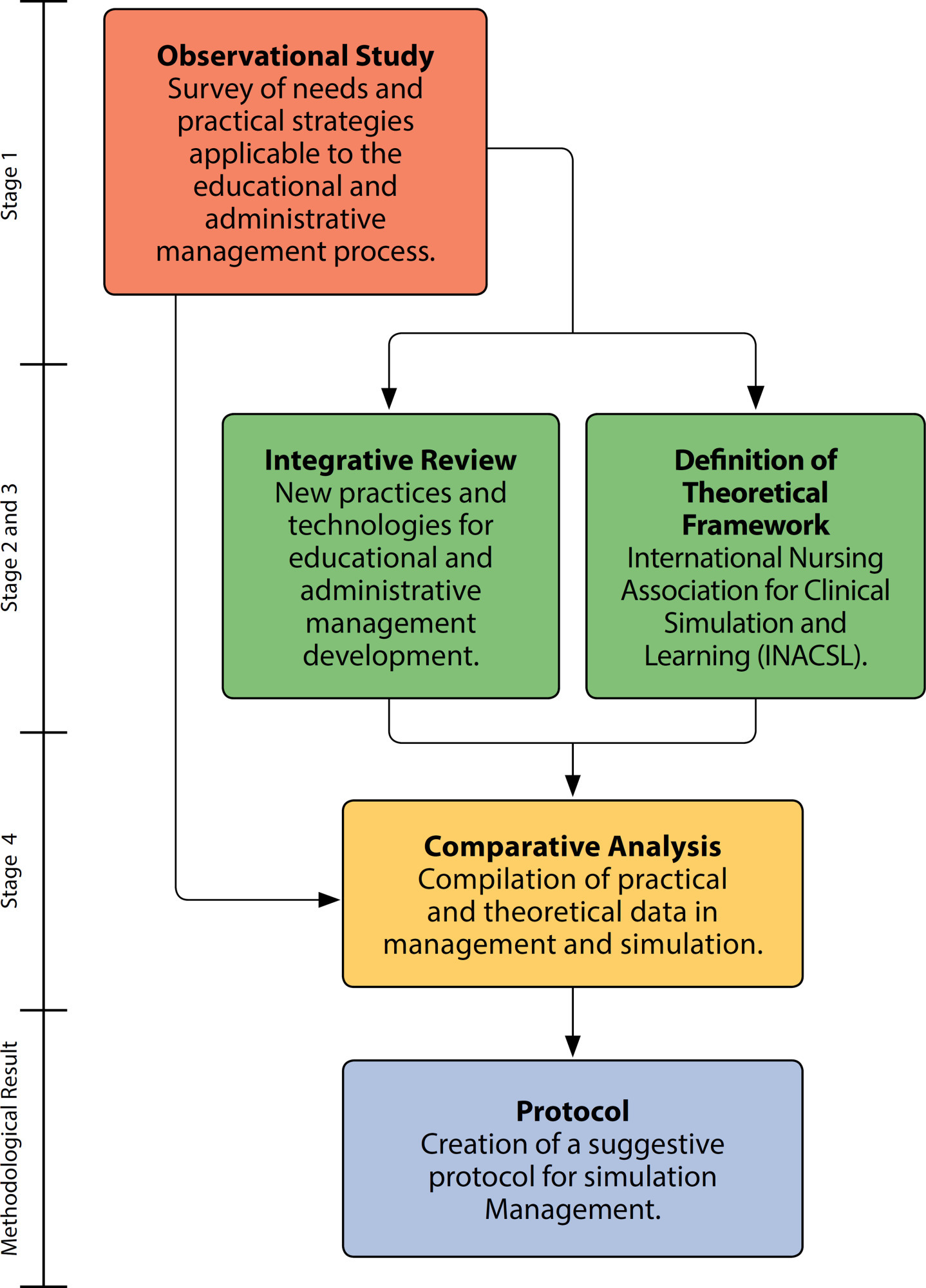
-
ORIGINAL ARTICLE08-19-2019
Health promotion by nursing technicians from the nurses’ perspective
Revista Brasileira de Enfermagem. 2019;72(4):979-987
Abstract
ORIGINAL ARTICLEHealth promotion by nursing technicians from the nurses’ perspective
Revista Brasileira de Enfermagem. 2019;72(4):979-987
DOI 10.1590/0034-7167-2018-0552
Views0See moreABSTRACT
Objective:
to analyze education and practice of nursing technicians in health promotion, from the perspective of teaching nurses of technical course and Primary Health Care nurses.
Method:
an exploratory study with qualitative data analysis, carried out in the city of São Paulo, through semi-structured interviews with nine public technical professors and 16 nurses from the basic health network. Data thematic analysis was carried out.
Results:
three thematic categories have emerged: Conceptions and experiences on health promotion; Nursing technician’s practice in health promotion; and Nursing technician education on health promotion.
Final considerations:
it is necessary to review the centrality given to technicalism in the education and practice of nursing technicians, contemplating the health promotion and seeking the development of professional competence for the construction of transformative practices aimed at valuing the autonomy and proactivity of the people in health and quality of life production.
-
REFLECTION02-15-2021
The belief in health in the adoption of COVID-19 prevention and control measures
Revista Brasileira de Enfermagem. 2021;74:e20200576
Abstract
REFLECTIONThe belief in health in the adoption of COVID-19 prevention and control measures
Revista Brasileira de Enfermagem. 2021;74:e20200576
DOI 10.1590/0034-7167-2020-0576
Views0See moreABSTRACT
Objective:
Reflect, in the light of the Health Belief Model, on the adoption of behavioral measures in the context of COVID-19.
Methods:
Theoretical-reflective essay, based on the Health Belief Model, to reflect on adherence to preventive behaviors in the pandemic of COVID-19.
Results:
Adherence to preventive behaviors is strongly influenced by socioeconomic, territorial, political and individual factors in the face of critical health situations. In addition, the spread of false news modulates the thinking and execution of behavioral actions in the population.
Final Considerations:
It is necessary to understand the importance of health communication processes and the use of tools aimed at responsible human behavior and engaged in the adoption of a preventive posture.
-
ORIGINAL ARTICLE04-07-2023
Suicide attempts by adolescents assisted in an emergency department: a cross-sectional study
Revista Brasileira de Enfermagem. 2023;76(2):e20220137
Abstract
ORIGINAL ARTICLESuicide attempts by adolescents assisted in an emergency department: a cross-sectional study
Revista Brasileira de Enfermagem. 2023;76(2):e20220137
DOI 10.1590/0034-7167-2022-0137
Views1See moreABSTRACT
Objectives:
to identify and characterize the care provided to adolescents admitted to an emergency department due to a suicide attempt.
Methods:
an observational, cross-sectional, descriptive study with a retrospective approach, carried out with medical records of adolescents aged 10 to 19 admitted for suicide attempts, between January 2015 and July 2020, in an emergency department. Data were subjected to descriptive and inferential analysis.
Results:
eighty-eight service occurrences were identified, mainly to females, exposed to multiple risk factors. Exogenous intoxication was the main method used, occurring at home and on weekdays. There were systemic repercussions, requiring multiple interventions and hospitalizations. Only 26% of cases were notified.
Conclusions:
adolescents treated for suicide attempts were exposed to multiple risk factors, with intoxication as the main means used. There is concern about the underreporting of cases and the logic of clinical care and medicalization.
-
ORIGINAL ARTICLE09-07-2020
Profile and entrepreneurial intention of nursing students: a comparison between Brazil and Chile
Revista Brasileira de Enfermagem. 2020;73(6):e20190890
Abstract
ORIGINAL ARTICLEProfile and entrepreneurial intention of nursing students: a comparison between Brazil and Chile
Revista Brasileira de Enfermagem. 2020;73(6):e20190890
DOI 10.1590/0034-7167-2019-0890
Views0See moreABSTRACT
Objective:
to identify and compare factors associated with profile, intentions, motivations, and barriers to entrepreneurial behavior of nursing students from Brazil and Chile.
Methods:
this cross-sectional study was carried out between March and September 2018 including 889 nursing students. A form was used to assess the socio-demographic profile, professional claims, entrepreneurial intentions and motivations. Statistical analysis used Chi-Square and Fisher’s Exact tests, with a 5% significance level, and a simple logistic regression model.
Results:
there are significant differences between countries in the profile of students and in the motivations studied, but not in professional pretensions and entrepreneurial intentions. Lack of education on the subject reveals itself as an important barrier to entrepreneurship.
Conclusion:
given the lack of teaching entrepreneurship in undergraduate nursing courses and the characteristics inherent to students, education must be appropriate to different cultures to prepare future professionals for other areas of practice.
-
REVIEW10-05-2020
Self-efficacy of health professionals in hand hygiene practice: is it possible to measure?
Revista Brasileira de Enfermagem. 2020;73:e20190873
Abstract
REVIEWSelf-efficacy of health professionals in hand hygiene practice: is it possible to measure?
Revista Brasileira de Enfermagem. 2020;73:e20190873
DOI 10.1590/0034-7167-2019-0873
Views0See moreABSTRACT
Objective:
To identify in the literature the tools used to measure self-efficacy of health professionals in hand hygiene.
Methods:
Integrative literature review carried out by consulting the databases PubMed, Scopus, Web of Science, Cumulative Index to Nursing and Allied Health Literature, Europe PubMed Central, and Science Direct using the descriptors Self Efficacy, Hand Hygiene, and Health Personnel.
Results:
Six articles, all of which with observational design, were selected. It was possible to infer that four studies used validated instruments to measure self-efficacy of health professionals in the conformity with the recommendations for hand hygiene. The other studies used questionnaires that were not validated.
Final considerations:
Despite the extensive literature on hand hygiene, there is a lack of scientific evidence regarding the use of validated instruments to measure self-efficacy of health professionals in the procedure. The use of properly validated psychometric instruments is useful to guarantee the quality of results in studies.

-
ORIGINAL ARTICLE05-24-2021
Content validation of an educational booklet for asthma control and management in children
Revista Brasileira de Enfermagem. 2021;74:e20200353
Abstract
ORIGINAL ARTICLEContent validation of an educational booklet for asthma control and management in children
Revista Brasileira de Enfermagem. 2021;74:e20200353
DOI 10.1590/0034-7167-2020-0353
Views0See moreABSTRACT
Objective:
to validate the content and appearance of the educational booklet “You can control your child’s asthma – let’s learn together?” with parents and caregivers of children with asthma.
Methods:
this is a methodological study, carried out with 34 mothers and caregivers of children, from two to 10 years old, diagnosed with asthma. The educational booklet validation was performed using Content Validity Index (CVI) and assessment of comprehension, attractiveness, self-efficacy, persuasion, and cultural acceptance domains.
Results:
the booklet was considered clear (99.8%) and relevant (100%), with a global CVI of 0.99. Domain assessment proved to be an easy-to-understand tool, culturally appropriate, attractive, with persuasive power and promoting self-efficacy.
Conclusion:
the booklet is valid and adequate for promoting the self-efficacy of parents and caregivers in childhood asthma control and management, potentially scalable to other realities of outpatient care.
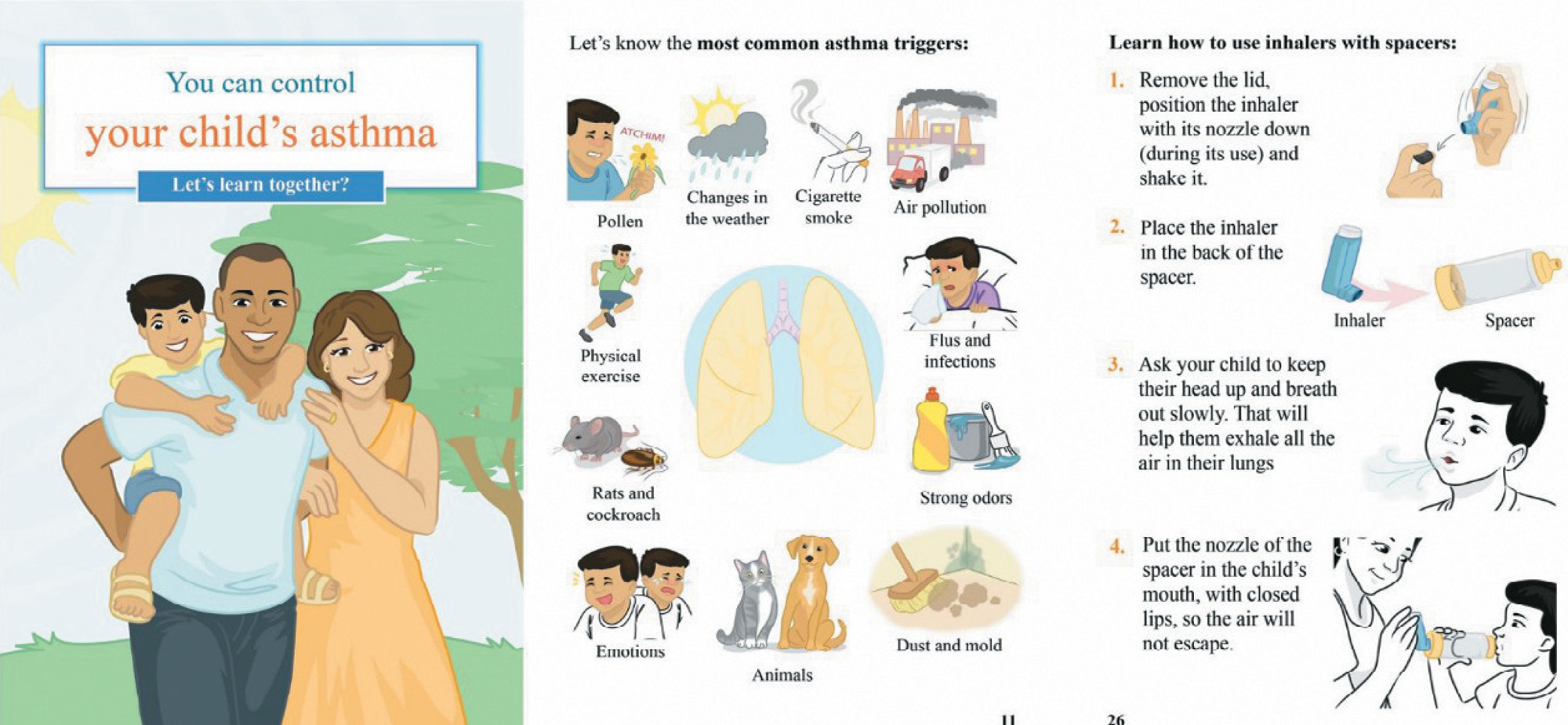
Search
Search in:
Nuvem de Tags
Adolescente (85) Atenção Primária à Saúde (239) COVID-19 (91) Criança (91) Cuidados de Enfermagem (269) Educação em Enfermagem (151) Educação em Saúde (139) Enfermagem (930) Enfermagem Pediátrica (86) Estudantes de Enfermagem (77) Estudos de Validação (131) Família (87) Idoso (208) Promoção da Saúde (99) Qualidade de Vida (104) Saúde do Trabalhador (86) Saúde Mental (145) Saúde Pública (82) Segurança do Paciente (150) Tecnologia Educacional (100)



